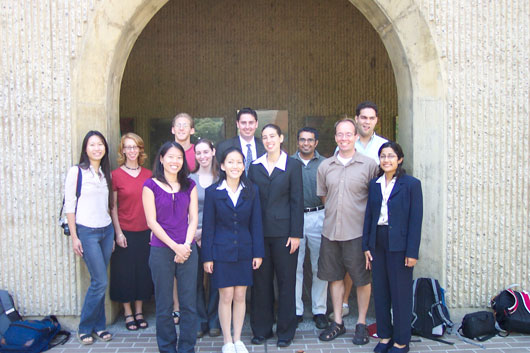
New
Student Group to Focus on Law and Biotechnology
--
by Pablo Arredondo
Stanford BioLaw was founded in the
fall of 2002 with the primary objective of promoting discourse and
debate, on the myriad issues arising at the interface of law and
biotechnology. While many law schools have student groups that focus
broadly on legal aspects of new technology, Stanford BioLaw is among
the first law student groups to focus exclusively on biotechnology.
Given the enormous difficulty and wide range of legal dilemmas ahead,
however, we predict that we will not be the last.
Stanford BioLaw benefits from being located in the heart of
“Biotech Bay”, the region where many of the scientific
discoveries that ushered in our tremendous new capacities happened,
and where cutting-edge discoveries continue to happen. Dozens of
leading biotechnology corporations can be found within just miles
of the Law School. The campus is home to many biotechnology centers,
including a new interdisciplinary research institute, Bio-X, and
the recently founded Center for Law and the Biosciences. And, of
course, world-famous weather always helps when trying to draw speakers.
Although Stanford BioLaw is run exclusively by law students,
from the beginning we have made a point of advertising our events
to graduate students in other schools. One of our goals is to create
a forum for all interested parties, not just future lawyers, to
debate the wisdom of biotechnology regulations, both proposed and
enacted. In our first year we held four speaker events with topics
including comparative database protection in Europe and the United
States, cloning, international gene patent regimes, and the effect
of gene patents on the accessibility of genetic testing. We look
forward to many more lively discussions this year.
In February of 2004, Stanford BioLaw will hold its first annual
Brave New Law conference. This year’s conference will focus
on legal issues surrounding the interface of biotechnology and human
reproduction. We are grateful to the editors of the American Journal
of Bioethics, who have agreed to publish the proceedings of the
conference on their widely visited website. It is our hope that
the Brave New Law conferences will become a consistent forum for
in-depth discussion of new legislative attempts to regulate biotechnology.
|
